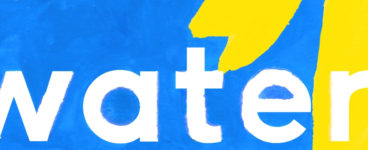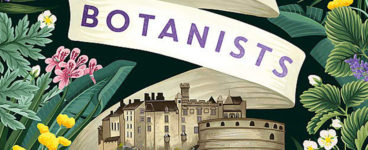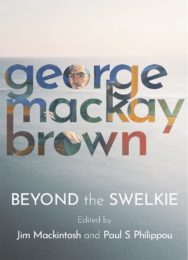‘Quiet meditations, the start of a lovely dawn / broken, piece by piece as day breaks.’
Beyond the Swelkie is a collection of new poems and essays to mark the centenary of George Mackay Brown, and you can treat yourself to some select works from the collection below.
Extract taken from Beyond the Swelkie
By Jim Mackintosh & Paul Philippou
Published by Tippermuir Books
The Ocean of Time
In memory of George Mackay Brown
Stewart Conn
This elegiac sequence, written shortly after George Mackay Brown’s death while Stewart Conn was working on a radio version of the novel from which it takes its title, first appeared as a Christmastime tribute in The Scotsman. The early volume, The Year of the Whale, was published by the Hogarth Press in 1965. Erlend Brown is George’s artist nephew. Tam MacPhail ran Stromness Books & Prints, and his wife Gunnie Moberg collaborated with George on Orkney Pictures and Poems (1996). Hopedale was his trusted friends Archie and Elizabeth Bevan’s house, in Stromness. Gypsy was a black-and-white cat he regularly looked after (Letters to Gypsy, 1990).
i
Hard to think your one-man
welcoming party has gone;
your prow-chin left
harbour, its voyage done;
your workroom window
facing out to sea,
once a source of light,
now a blind eye;
no handwritten note
pinned to your door
saying you’ll be
back shortly.
The iron harpoon
you were given in the Year
of the Whale has found
a new home with Erlend.
ii
More and more your
friends miss you; this
the first winter
they’ll be without you.
Yet your presence
is all-pervasive:
in Tam’s book-cave,
Gunnie’s magic lens;
night-tread from Hopedale;
scratch of pen, salt
on the pane; word-geese
massed on the skyline.
And as the mists clear,
a familiar figure
seen wraithlike
on headland and shore.
iii
Everyone’s talk
so warming,
it’s a shame
you can’t join them.
Or simply
rock slowly
in your old chair,
Gipsy on your knee.
Rain blatters
at the window;
dark shapes
claw at the pane.
Over Hamnavoe,
a double rainbow:
vision and dream,
a perfect cradling.
iv
South of Yesnabay
a solitary seal-pup
seems stranded,
far from the ebb.
It belly-flaps
over the rocks,
ungainly till
it plunges
and reappears
riding the crest,
eyeing me from safety,
all muscular sheen.
Your life spent
in your element,
a dogged defiance
of surging forces.
v
Weaver of tales,
a spirit to match,
you caught the spirit
of these Islands,
merging emblem
and meaning, welding
‘holy and carnal
in one flame’.
Fitting, in the hush
of St. Magnus,
to come across these
lines from your poems
in the key
to the west window:
‘golden sun, wheatstalks,
fishes’.
vi
I see you on a blue
bench by the pier
against a white wall,
all fisherknit jersey
and tangled hair,
eager as a boy
going to sea
for the first time.
Now in the longship
of the setting sun
your last journey.
Gannet and gull
on the cliff-edge squall,
as the fiery vessel
glides behind Hoy.
Darkness. A muffled bell
*
Islander
W N Herbert
At midsummer midnight in Stromness I stare
out past some child’s bear perched on the pier,
my father three months dead, you twenty years
or nearly, and neither nigh a toy’s safe harbour.
At MacDiarmid’s bidding word-storms sat on Whalsay
like good dogs by his epic-fuelled hearth;
MacLean’s regret stoked lava-born Raasay
till Gaelic’s stag stared from its molten wreath.
You grew a mountain from the sea’s swung root,
and deepened in your winters that old trench
where tides may race between us till they drench,
then made a wreck-oiled island of your book.
MacCaig crofted on two lanes in the capital,
Rose Street for barley rig and Leamington for peat;
Graham from his Cornish caravan saw all
the canvas and the tin-tack waves he’d need.
A few treeless meadows awaited your text
amid the overtones of Rackwick where next
to scriptory herds, you sermonised to shoals
how poetry’s an archipelago of souls:
While Crichton Smith found Murdo’s maddened dance
in Callanish’s storm-rewritten stance;
and Morgan, orbiting in Anniesland,
hung out a banner all Earth might understand.
This much more than anyone you could tell:
how the pen’s tooth gnaws at age’s keel
till the ferried whispers slow their reel
and strand us on a skerry of the self.
So why did I take so long to reach the island
these hailed as verse’s haven? Because grief’s gale
that gulls and claws us all until we fail
can in its random grace then drive us to dry land.
*
Silence
Julie McNeill
No more music now,
not a note shall flow
from that small house at Yesnabay
just south of Skara Brae,
a silence now at Sandwick
tucked in and bedded down
amidst the coastal cliffs
bricks built up like sea stacks
a shelter there in Stromness
from wind-crashed waves
from the rugged, wild, enchanting
and the impossible to tame.
A pause, here
for stories,
for humour
and for drams.
As birds of every colour
circle overhead,
words wash
and rush like rapids
through our
reeling heads
as we do our best
to content ourselves
with silence.
*
Madras Morning
After ‘Hamnavoe’ – a humble offering
Leela Soma
Orangey mustard streaks the lightening sky
the cool morning sun spreads rays of gold
the soft dew weeps on the flowering white buds
blades of grass sway to the morning breeze.
The Gurkha opens the gate stretching his sleepy arms
ayah sweeps the veranda, bent over her broom
cook roasts the coffee beans delicious aroma rises
the milk boils as he turns the handle of the grinder.
The flicked radio sings the ‘Suprapadam’,
the dawn raga lifts the soul as the Lord is awakened.
Quiet meditation, the start of a lovely dawn
broken, piece by piece as day breaks.
Beyond the Swelkie by Jim Mackintosh & Paul Philippou is published by Tippermuir Books.
ALSO IN THIS ISSUE

 Small Bodies of Water
Small Bodies of Water
‘I grew up with access to swimming lessons and public swimming pools – privileges that are easy to t …

 The Fair Botanists: Interview with Sara Sheridan
The Fair Botanists: Interview with Sara Sheridan
‘For me the fascination is always in asking the question: where do we come from?’













